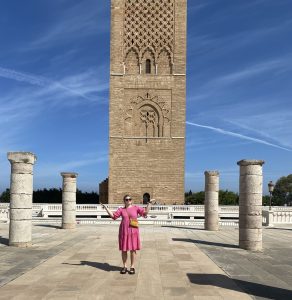With an interest in pursuing research, Maduri joined us for a week of work experience in June 2024. At the time, she was a Year 12 student (now in Year 13) at Nower Hill High School, a school which joined the Study of Cognition, Adolescents and Mobile Phones study in 2023. During her time with us, Maduri learnt about public engagement in research including interviewing academics, designing promotional materials and conducting a SCAMP social media takeover) as well as the research process and academic writing. Along with fellow work experience students, Maduri also produced and narrated an animated video (using Lego) and attended various Imperial events. At the end of her week with us, we asked Maduri to write about her experience so we can continue to improve our work experience programmes and learn through young people’s lived experiences. Here is what she had to say:
This week has been incredibly interesting. It was packed with adventurous tasks, exceeding my expectations and was beyond just doing ‘office’ work as I had initially expected. There were multiple roles, from making a Lego stop-motion video to interviewing Professor Dougal Hargreaves.
Working with SCAMP was not just about conducting research and sitting behind the computer but meeting new people and networking during Mohn Mingle sessions, during which I was able to widen my knowledge of the world of work and research. The team were welcoming, enabling me to build my confidence as we discussed their career trajectories which led to their current roles. My perception of this work field changed as a result of this very open working environment.
There were several growth opportunities during this placement, such as learning more about Professor Dougal Hargreaves’s career and what his work in adolescent health meant to him. We also got the chance to learn more about their ADR UK project. He provided us with a better understanding of the whole process of this project and the effect it would have in the North-West of London. This will impact me directly, as I am from this area. The interview enabled us to gain a better understanding, and once we had finished interviewing him, we could ask questions related to our future careers, which was very helpful.
When researching ADR UK and the use of administrative data, we created a stop motion video, targeted towards 12-year-olds (see below). This introduced us to and allowed us to dive deeper into the process of analysing data. But most of all, seeing the reactions of the Mohn Centre staff when they watched what we had created allowed us to see our work was appreciated and entertaining, creating a sense of joy and satisfaction. This video allowed us to bridge the barrier between teenagers and their understanding of how their data is anonymised and used.
While we had our fair share of fun, we also conducted literature reviews. I was tasked with reading articles and papers written by other academics and categorise their findings and research. The skills I developed from this task better prepared me for what will be asked of me when I go to university and in the future when I enter the work field. Despite having a few difficulties at the start of the process, including trying to figure out what this task even meant, with practice, I was able to improve my understanding and be more concise with the sources I found. There was also support from the staff, so that this was not a process I had to go through on my own.
Despite our school providing us with career learning opportunities, this experience was different from anything I have previously been shown, as it was more relevant to my personal interests. I enquired about placement opportunities with the Study of Cognition, Adolescents and Mobile Phones (SCAMP) during their data collection session at my school, which put me in contact with Nicole Curtis, a researcher at SCAMP. This is certainly an opportunity that I would recommend to others. I learnt new research skills and improved my social and communication abilities, allowing me to step out of my comfort zone and interact with new people. I hope to come back to the Mohn Centre and work alongside SCAMP in the future, as I had a wonderful experience. The skills that I have learnt in the past week will allow me to apply to my future career path in Law with confidence.
Overall, I had a spectacular experience working alongside a wonderful team, who taught me new skills which will come of use in the future, allowing me to gain experience of working in a research field. I would love to work with them again, as I believe they provide you with several opportunities whilst showing you the community they have built which focuses on the improvement and wellbeing of others.
 Visiting Morocco has always been on a list of countries I hoped to visit, with its vibrant culture, colourful pottery, and of course the delicious food! This year, I had the extraordinary opportunity to not only visit but participate in a significant event that celebrates the curiosity and creativity of young minds – the 17th annual festival of Scientific Leisure hosted by the Association Marocaine des Petits Débrouillards (AMPD).
Visiting Morocco has always been on a list of countries I hoped to visit, with its vibrant culture, colourful pottery, and of course the delicious food! This year, I had the extraordinary opportunity to not only visit but participate in a significant event that celebrates the curiosity and creativity of young minds – the 17th annual festival of Scientific Leisure hosted by the Association Marocaine des Petits Débrouillards (AMPD).